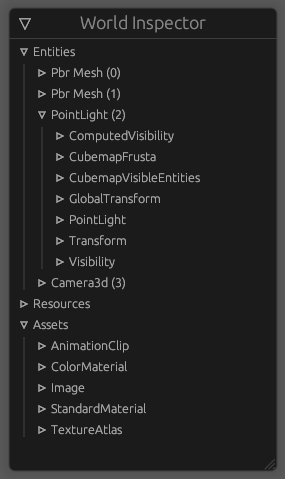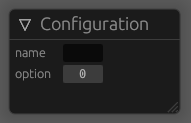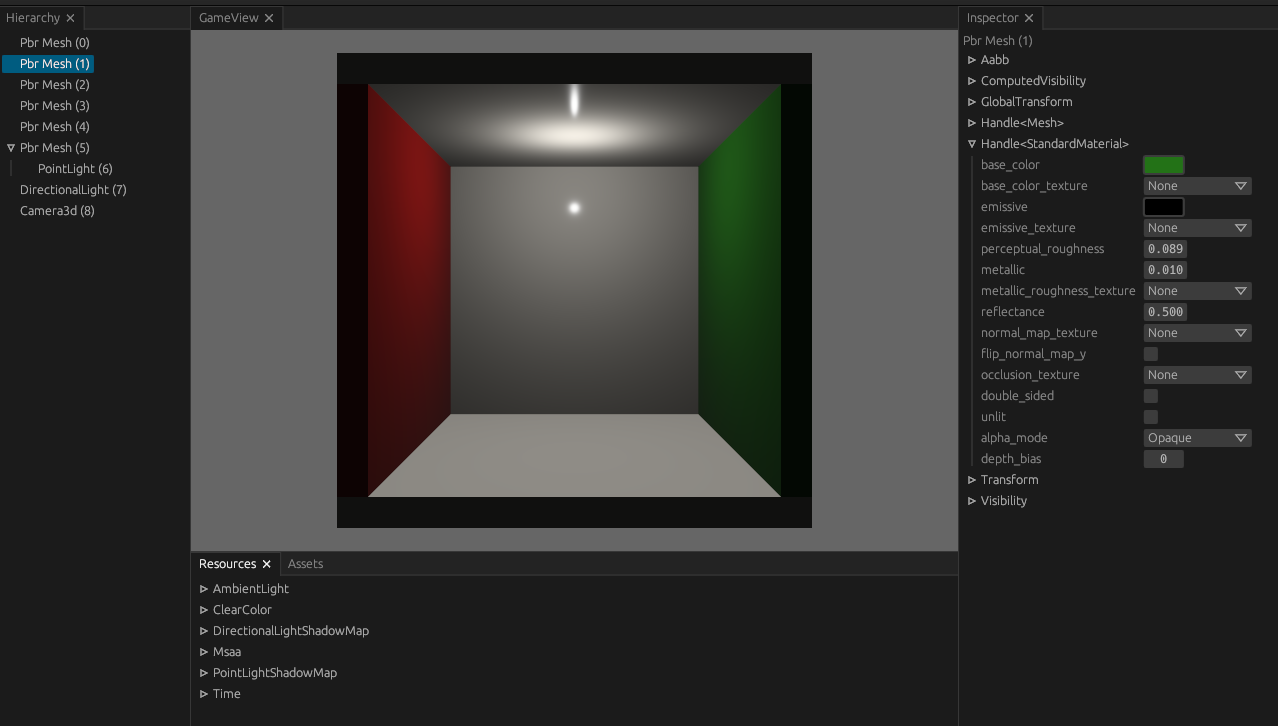bevy-inspector-egui
| Crates.io | bevy-inspector-egui |
| lib.rs | bevy-inspector-egui |
| version | 0.36.0 |
| created_at | 2021-01-18 17:28:53.228789+00 |
| updated_at | 2026-01-14 19:58:56.892962+00 |
| description | Inspector plugin for the bevy game engine |
| homepage | |
| repository | https://github.com/jakobhellermann/bevy-inspector-egui/ |
| max_upload_size | |
| id | 343592 |
| size | 526,841 |
documentation
README
bevy-inspector-egui
Examples can be found at ./crates/bevy-inspector-egui/examples.
This crate contains
- general purpose machinery for displaying
Reflectvalues in reflect_inspector, - a way of associating arbitrary options with fields and enum variants in inspector_options
- utility functions for displaying bevy resource, entities and assets in bevy_inspector
- some drop-in plugins in quick to get you started without any code necessary.
The changelog can be found at docs/CHANGELOG.md.
Use case 1: Quick plugins
These plugins can be easily added to your app, but don't allow for customization of the presentation and content.
WorldInspectorPlugin
Displays the world's entities, resources and assets.

use bevy::prelude::*;
use bevy_inspector_egui::{bevy_egui::EguiPlugin, quick::WorldInspectorPlugin};
fn main() {
App::new()
.add_plugins(DefaultPlugins)
.add_plugins(EguiPlugin::default())
.add_plugins(WorldInspectorPlugin::new())
.run();
}
ResourceInspectorPlugin
Display a single resource in a window.

use bevy::prelude::*;
use bevy_inspector_egui::prelude::*;
use bevy_inspector_egui::quick::ResourceInspectorPlugin;
// `InspectorOptions` are completely optional
#[derive(Reflect, Resource, Default, InspectorOptions)]
#[reflect(Resource, InspectorOptions)]
struct Configuration {
name: String,
#[inspector(min = 0.0, max = 1.0)]
option: f32,
}
fn main() {
App::new()
.add_plugins(DefaultPlugins)
.init_resource::<Configuration>() // `ResourceInspectorPlugin` won't initialize the resource
.register_type::<Configuration>() // you need to register your type to display it
.add_plugins(EguiPlugin::default())
.add_plugins(ResourceInspectorPlugin::<Configuration>::default())
// also works with built-in resources, as long as they are `Reflect`
.add_plugins(ResourceInspectorPlugin::<Time>::default())
.run();
}
There is also the StateInspectorPlugin and the AssetInspectorPlugin.
Use case 2: Manual UI
The quick plugins don't allow customization of the egui window or its content, but you can easily build your own UI:
use bevy::prelude::*;
use bevy_egui::EguiPlugin;
use bevy_inspector_egui::prelude::*;
use std::any::TypeId;
fn main() {
App::new()
.add_plugins(DefaultPlugins)
.add_plugins(EguiPlugin::default())
.add_plugins(bevy_inspector_egui::DefaultInspectorConfigPlugin) // adds default options and `InspectorEguiImpl`s
.add_systems(EguiPrimaryContextPass, inspector_ui)
.run();
}
fn inspector_ui(world: &mut World) {
let Ok(egui_context) = world
.query_filtered::<&mut EguiContext, With<PrimaryEguiContext>>()
.get_single(world)
else {
return;
};
let mut egui_context = egui_context.clone();
egui::Window::new("UI").show(egui_context.get_mut(), |ui| {
egui::ScrollArea::vertical().show(ui, |ui| {
// equivalent to `WorldInspectorPlugin`
bevy_inspector_egui::bevy_inspector::ui_for_world(world, ui);
egui::CollapsingHeader::new("Materials").show(ui, |ui| {
bevy_inspector_egui::bevy_inspector::ui_for_assets::<StandardMaterial>(world, ui);
});
ui.heading("Entities");
bevy_inspector_egui::bevy_inspector::ui_for_world_entities(world, ui);
});
});
}
Pair this with a crate like egui_dock and you have your own editor in less than 100 lines: examples/egui_dock.rs.

Cargo features
highlight_changes- highlight changed values every frame. Ideally this should be runtime-configurable, but it was implemented like this as a stopgap solution. If you'd like to configure this at runtime, please open an issue to let me know it's more of a priority.bevy_pbr(default): register default options forbevy_pbrtypes. You should disable this if you don't usebevy_pbrto reduce the dependency footprint.bevy_gizmos: enable inspecting ofGizmoConfigGroup
FAQ
Q: How do I change the names of the entities in the world inspector?
A: You can insert the Name component.
Q: What if I just want to display a single value without passing in the whole &mut World?
A: You can use reflect_inspector::ui_for_value. Note that displaying things like Handle<StandardMaterial> won't be able to display the asset's value.
Q: Can I change how exactly my type is displayed?
A: Implement InspectorPrimitive and call app.register_type_data::<T, InspectorEguiImpl>.
Bevy support table
| bevy | bevy-inspector-egui |
|---|---|
| 0.18 | 0.36 |
| 0.17 | 0.35 |
| 0.17 | 0.34 |
| 0.16 | 0.33 |
| 0.16 | 0.32 |
| 0.16 | 0.31 |
| 0.15 | 0.30 |
| 0.15 | 0.29 |
| 0.15 | 0.28 |
| 0.14 | 0.27 |
| 0.14 | 0.26 |
| 0.14 | 0.25 |
| 0.13 | 0.24 |
| 0.13 | 0.23 |
| 0.12 | 0.22 |
| 0.12 | 0.21 |
| 0.11 | 0.19-0.20 |
| 0.10 | 0.18 |
| 0.9 | 0.14-0.17 |
| 0.8 | 0.12-0.13 |
| 0.7 | 0.10-0.11 |
| 0.6 | 0.9 |
| 0.6 | 0.8 |
| 0.6 | 0.7 |
| 0.5 | 0.5-0.6 |
| 0.5 | 0.4 |
| 0.4 | 0.1-0.3 |